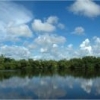The eye of Hurricane Irma went directly over us while it was listed as a Category 2 hurricane and after a week without electricity we finally have power back. Thankfully we remained safe and didn't have any property damage. Additionally I didn't lose any fish but the massive daily water changes provided a significant workout.
During the storm the barometric pressure here dipped to 28.38 (961 mbar). Although this isn't nearly as low as Hurricane Wilma (2005) that reached 26.05 (882 mbar), this is still well below average for this area (30.03 in. or 1017 mbar). I realize that there is a difference between water pressure and air pressure, but I know that the change in air pressure has an effect on many tropical fish species including many catfish and loaches. My question is what are the effects of low pressure or change in pressure on any North American native fishes? Are there any specific academic papers that address this issue? Any specific anecdotal experiences?












